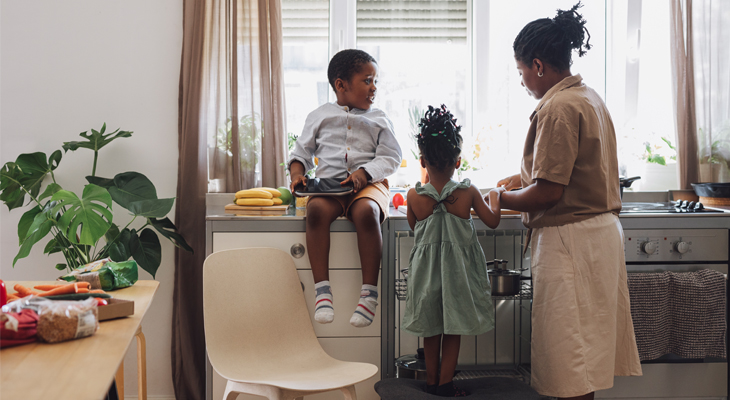
“Training” is often viewed as a dirty word in secular parenting circles. I’ve even seen it called “ugly.” I’ve often heard those who oppose the idea of training children say things such as “I’m not teaching my children so much as learning from them,” and “Let your children be your guide.” These phrases sound very earthy and wise but quickly show their lack of substance when pitted against even the mildest toddler meltdown. I’m not exactly sure what I’m supposed to learn from my two-year-old’s tendency to throw himself down on the filthy grocery store floor and comingle his hot tears with the gum from someone’s shoe, other than that he is a sinner and—based on how irritated I can get at this behavior—so am I.
Because while I agree that we can learn much from our children’s better qualities, I would be lying if I said that I didn’t genuinely believe an abdication of our roles of training our children is also an abdication of excellence in motherhood. Just like an Olympic gymnast would never forgo a rigorous training course if she wants to win the gold, we would be shortsighted as parents to choose the seemingly easy road of passive parenting if we desire to “press on toward the goal to win the prize for which God has called (us) heavenward in Christ Jesus” (Philippians 3:14). Because what appears to be the easier choice in the short term eventually reveals itself as very difficult, indeed, when we encounter significant behavioral and relational snarls in the future. Not only that, but the Bible asks more of us, which is why it is so key to first invest in training ourselves.
If we have not first trained ourselves to persevere through the hard when necessary, how can we expect our children to face with any level of equanimity their “crumbly” clothes (my four-year-old’s panicky description of any article of clothing with wrinkles—which, as a mama with a rather full schedule that did not include much ironing, was all of them)? If we have not first modeled dependence upon Christ day in and day out, how can we encourage our kids to turn to Jesus in their times of need? If we have not read our Bibles, how can we even know what Scripture has to say about our responsibilities to our own offspring, much less imagine that they will want to find out more for themselves?
Don’t get me wrong: We are not Jesus. We cannot save our children, nor can we vouch for their righteousness. We cannot convict them at a heart level. Only the Holy Spirit can do that. Not only that, but any secular parent who wants “results” more than holiness could, with enough effort, produce well-trained children.
Still, I genuinely believe that certain universal principles of child training can be applied to just about any situation that involves children. And I have become more convinced of these principles the longer I’ve been a mother and the more children I’ve had, even though each child has displayed distinct preferences and a unique personality pretty much from the moment of birth.
The core values of child training that my husband and I adhere to, no matter the personality or the scenario, are these:
communication
consistency
discipline
follow-through
It sounds so basic in principle. But, my, how hard it can be in practice! By the time Evy and Nola came along, I had already taught three children how to read, use the potty, buckle their own car seats, and eat with utensils. Before the “twinsies” ever reached the “terrible twos” (which is a misnomer in my opinion; I’ll take a two-year-old over a threenager any old day), I was fairly well versed in young children’s milestones and felt reasonably convinced our four training foundations were key components in surviving some of the more difficult stages that I had encountered.
First, I communicated the behavior I expected from my girls. This is huge and yet so basic that we often forget this step and simply throw everybody in the car willy-nilly to run errands. When we tumble out at the grocery store with no briefing or plan, we wonder why everyone seems intent on touching at least three surfaces of every item in the store. The answer? They weren’t reminded about protocol.
It doesn’t mean they always do exactly what I ask—not by a long shot—but at least they are equipped with what they should be doing in any given scenario, which sets us up for success instead of confusion.
When it came to discipline, it had a twofold meaning:
It required discipline on my part to be consistent with communicating my expectations.
I had to be willing to offer appropriate discipline when the twins didn’t obey the guidelines that I’d clearly given them.
Last, but so far from least, I had to follow through—and do so right away. For me, that meant applying consequences, such as early bedtimes and lost privileges, and the painstaking job of following two two-year-olds through the house as they picked up and “folded” (ever seen a toddler fold an article of clothing?) all their discarded clothes, took them to their room, and replaced them in drawers.
Because that is the ultimate truth about training: We have been entrusted with the privilege of “training our children in the way they should go” as a reflection of the care, effort, and love that God invests in us. To give in when it is hard or inconvenient is an inaccurate portrayal of our Father God’s commitment to our holiness. Yes, we will lack steadfastness at times. But he never does. And the more we train ourselves to prioritize consistency and follow-through, the better we mirror his faithful character for our children.
***
The above excerpt is from the new book M is for Mama by Abbie Halberstadt. Abbie is a mother of ten(!), including two sets of twins. Abbie has a heart for helping mamas take on the awesome privelege and responsibility of christlike motherhood. Learn more here.
You can enter to win a free copy of Abbie’s book, along with a brand new Crock-Pot and some other awesome books for moms in our May giveaway. Enter to win here.

Leave a Reply